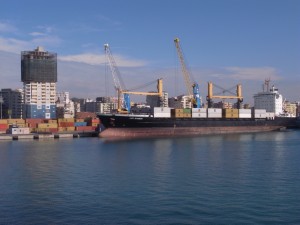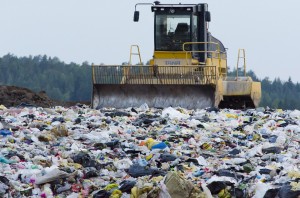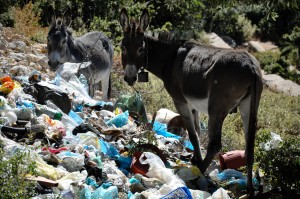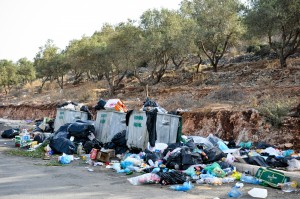Toxic rubbish from Italy is being imported into Albania before disappearing without trace, an investigation into the murky world of waste exports has revealed.
*This article was initially published in 2012 in the October 12-25 print issue of Prishtina Insight. To browse seven years of Prishtina Insight online, click here to become a subscriber.
Toxic waste, including lead batteries, expired medicines, and oil residue, is being imported into Albania from Italy, despite the poor state of the country’s recycling industry and a virtual ban on such activity.
An investigation into the world of waste trading also reveals that Italian businessmen, some allegedly linked to organized crime, gambling operators, and others with convictions for financial crimes are involved in Albania’s waste market.
Meanwhile United Nations attempts to protect countries from waste dumping are being largely circumvented or ignored.
An investigation into the world of waste trading also reveals that Italian businessmen, some allegedly linked to organized crime, gambling operators, and others with convictions for financial crimes are involved in Albania’s waste market.
An emerging market
Albania banned imports of all types of waste imports in 2003, except those with specific permission from the country’s Council of Ministers.
But in 2004, an agreement between Italian businessman Manlio Cerroni and Albania heralded a new dawn in Albania’s waste trade.
Through a firm of his, Albaniabeg Ambient, Cerroni planned to build an incinerator on the other side of the Adriatic to burn Italian waste.
The deal fell through in 2005 after incoming Prime Minister Sali Berisha encountered widespread opposition.
But, a few years later, Berisha himself courted major Italian eco-businesses, attempting to secure bio-mass plants, wind farms, and other large investments in Albania.
In November 2011, arguing that Albania’s nascent recycling industry could not survive on the proceeds of domestic waste alone, the Berisha government approved a bill allowing for some waste imports that conform to a so-called “green list” of 56 materials.
Following an outcry by civil society organizations, Environment Minister Fatmir Mediu recently pledged to look at reducing the list of acceptable waste types to 25.
The mafia moves in
Dozens of Italian waste firms already operate legally in Albania, according to a search of the country’s official register. But experts in the field warn that legal traders are often fronts for illicit businesses.
Italian Mafia expert and politician Lorenzo Diana says that organized crime has moved into the illegal export of waste to Albania, after police clamped down on other illicit activities.
Europol also said that it wanted to see an “increased focus on illegal waste activities.”
“Europol has identified an increase in the volume of illegal waste shipments across borders,” the spokesman added, explaining that legal trading was often used to conceal illegal dumping.
“Company A makes an agreement with company B to dispose of waste legally,” he explained. “However, it has been identified that outside these agreements, waste is illegally trafficked and disposed.”
Europol says that Albania, Romania, and Hungary are prime destinations for toxic waste from southern Europe, Italy in particular.
The authorities have never shown any interest in waste management and the country is extremely polluted with urban waste, which is growing progressively worse. Lavdosh Ferruni
Lorenzo Diana has lived under armed guard since 1994 for campaigning against the Mafia. A member of a number of Italian parliamentary committees on crime, he was appointed the Democratic Party’s national director for combating the Mafia in 2006.
“Traffickers that used to travel back and forth with cigarettes between Albania and Puglia at one point said, ‘We can’t smuggle cigarettes anymore, so let’s start trafficking in human beings, drugs, and weapons,’ ” he said.
“Once contacts with Albania originally related to smuggling, weapons and others were in place, they used those routes for waste, too,” he continued.
Albanian environmentalist Lavdosh Ferruni says the government in Tirana turns a blind eye to the background of these traders.
“The authorities have never shown any interest in waste management and the country is extremely polluted with urban waste, which is growing progressively worse,” he said.
“If we add to this the other waste coming from other countries, it will lead to irreversible pollution,” he added.
“In fact, this is something that has already happened. We don’t trust our authorities.”
Disappearing waste
Italy has had some success in stopping illegal exports of waste to Albania, but evidence exists that toxic rubbish is still being taken from Italy to its poor neighbour.
On 13 October 2010, Italian customs officers boarded a ship in the port of Bari.
The documents for the cargo of 92 washing machines and 68 refrigerators, valued at 1,440 euros, were patchy and suspicious, Customs Agency documents showed.
Following an inspection, the eco-crimes unit of the Italian police was called in and an investigation was launched into whether this was an attempt to illegally import electronic waste to Albania and not second-hand goods, as was claimed.
Tens of thousands of tons of toxic waste have been sent from Italy to Albania in recent years, and the authorities in Tirana cannot account for it.
The investigation remains ongoing while the goods have been destroyed.
In July this year, after Italian customs stopped a vehicle at the port of Bari carrying 56 bales of dirty clothes without an export permit, another investigation began into illegal waste exports from Italy to Albania.
These discoveries, however, appear to be an exception to the rule. We have uncovered evidence that tens of thousands of tons of toxic waste have been sent from Italy to Albania in recent years, and that the authorities in Tirana cannot account for it.
This flow of rubbish has continued despite a virtual ban on such imports in Albania and despite international restrictions on developed countries exporting garbage to poorer neighbours.
Much of the hazardous material appears to have been exported under a little-known shipping convention called MARPOL, which allows ships to unload waste produced en route.
Experts say that even if the imports were technically legal, Albania does not have the facilities to deal with much of the hazardous waste.
We have also uncovered evidence of non-hazardous waste imports to Albania, which appear not to have been cleared by authorities in Tirana.
There are also concerns that the amounts of waste being released in Albania under MARPOL are excessive.
Albania’s Council of Ministers and the Environment Ministry have not provided any evidence showing that these exports were approved, which suggests that, under Albanian law, these shipments may have been illegal.
Toxic exports
Statistics collected by Italy’s Institute for Environmental Protection and Research reveal that in 2007 and 2008 various loads of toxic and non-toxic waste were disposed of in Albania.
The Italian institute has refused to release data for 2009, despite confirming that it had collected it.
In 2008, Italian-based companies disposed of thousands of tons of bilge oil, waste from fireworks, and half a ton of lead batteries, all of which were classified as hazardous, in Albania.
The data show that in 2007, almost 2,500 tons of bilge oil was released from Italy to Albania. This is the fluid that gathers in the lowest compartment of ships, which usually includes runoff water, oil, and other liquids. It is classed as hazardous, although there is a facility in Durres to treat it.
In 2008, Italian-based companies disposed of thousands of tons of bilge oil, waste from fireworks, and half a ton of lead batteries, all of which were classified as hazardous, in Albania.
Expired medicines, cables, iron and steel were also unloaded there, but were classified as non-hazardous.
The Lazio region, which includes Rome, also sent construction waste, biodegradable waste, and waste from food markets to Albania.
In 2009, the Campania region exported to Albania two tons of waste paint and varnish containing organic solvents or other dangerous substances; 200 kilograms of hazardous electronic equipment; half a ton of toxic lead batteries; 50 kilograms of “fluorescent tubes and other mercury-containing waste”; and 1,500 tons of bilge oil. Some 760 kilos of edible oil and fat were also exported as non-hazardous waste.
Basel Treaty ignored
The Basel Convention on the export and disposal of hazardous waste came into force in 1992 in an attempt to stop developed countries dumping hazardous waste in developing countries.
As signatories to the convention, Italy and Albania are obliged to submit information on all transboundary movements of hazardous and other waste annually to the convention’s secretariat, which is part of the United Nations.
The agreement followed a series of environmental scandals, which gave rise to the phrase “toxic colonialism.” These included the 1988 incident in which five ships transported 8,000 barrels of hazardous waste from Italy to the small town of Koko in Nigeria in exchange for $100 monthly rent for the farmland.
But our investigation has discovered that the international agreement is still widely ignored by both developing and developed countries.
The secretariat of the Basel Convention said it was aware of the problem but had no means to punish those flouting the law.
“Our mandate is to receive reports from the official focal points from each of the parties,” a spokesperson said.
“We do not have the means to know if they are missing data or not,” she added.
A UN conference on the Basel Convention in November 2011 noted “that the level of reporting appears to be declining.” A report submitted to the conference said that 65 of the 166 member states had provided no information for the year 2006; another 70 countries had provided “incomplete reporting and late” and only five countries had reported fully and on time.
Roberto Ferrigno, a founder of Greenpeace Italy and now an environmental consultant for several companies in Italy and in Europe, said the convention should have blocked exports from rich countries to developing ones.
“Nowadays, to dispose of hazardous waste in developing countries is forbidden,” Ferrigno, who still campaigns on waste-trafficking matters, said.
“This means that all the movements that before used to occur more or less in the daylight are nowadays underground,” he added.
But Ferrigno said that the authorities in Italy seemed willing to turn a blind eye to the convention.
Oil dumped in Durres
Thousands of tons of a hazardous mix of oil and water that collects in ships’ hulls, bilge oil, have also been exported to Albania in recent years for treatment.
While ships are allowed to unload this maritime detritus at ports, experts have described the quantities offloaded in Durres by one shipping company as worrying.
Italian authorities’ official list of exports, which we obtained, shows the source of much of the waste was Tirrenia di Navigazione S.p.A., a ferry company that has plied the Bari-Durres route daily for years.
Thousands of tons of a hazardous mix of oil and water that collects in ships’ hulls, bilge oil, have also been exported to Albania in recent years for treatment.
Under the Basel Convention, waste produced as part of “the normal operations of a ship” is regulated by MARPOL, the International Convention for the Prevention of Pollution From Ships, which allows such waste, even if toxic, to be offloaded into a port in order to avoid it being dumped at sea.

Bilge oil, a mix of oil and water that collects in ships’ hulls, has been dumped at the port of Durres, Albania. | “Durres 1” (CC BY-NC-ND 2.0) by claudionapoli
Questions remain, however, over the definition of “normal operations of a ship” and some legal experts maintain that, as soon as the waste is unloaded, the Basel Convention should apply.
These recommendations were presented in a paper put to the secretariat of the Basel Convention in 2011, setting out a list of proposals to reconcile the two sets of rules.
Irrespective of the legal loopholes, an official with REMPEC, the UN’s Mediterranean marine pollution response center, which monitors MARPOL, said the amount of bilge oil that the ferry company declared as exports to Albania was “unreasonably” high and could not have been produced by the ships on that route alone.
Over two years, the firm exported more than 5,000 tons of bilge oil to Albania.
“I discussed it with my colleague and he also thinks this is not a reasonable figure,” a REMPEC official said on condition of anonymity.
Significantly, no other ferries operating the route between Italy and Albania reported any exports of bilge oil.
Commander Rodolfo Giovannini of the Italian Coast Guard, who works at the Italian Environmental Protection Ministry, also suggested that the amount reported by Tirrenia was excessive.
It was “compatible with the amount that may be drained in a year from all the ships that dock in a port like Durres,” he said, rather than the two ferries serving the Durres-Bari route each day.
Sources in Tirrenia, which has been privatized and renamed Compagnia Italiana di Navigazione, said there was nothing unusual about the quantities, however.
“It seems excessive but for me 2,500 tons [per year] is actually too little,” one company source said.
Italian gambling entrepreneur turns to Albania
Angelo Antonio Abrusci is best known in Italy for his string of bingo businesses.
But Abrusci, who has several convictions for tax fraud, is also a serious player in waste collection in Albania as well as owning a casino in Romania.
The Italian newspaper La Repubblica in 2002 described him as the “scion of a family of builders that has produced the first billionaires from Puglia for years.”
The same article noted that Abrusci was diversifying by investing in waste disposal in Albania.
The article mentioned no specific firms, our investigation has discovered that Ecoaqua, registered in Italy and Albania in March 2000, has won at least two contracts from Tirana city council to collect waste and has bid for work in other towns.
The firm is part owned by Finanziaria Immobiliare Partecipazioni, which is itself owned by Abrusci, among others.
Ecoaqua’s CEO is Antonio Abrusci, from the same town of Acquaviva delle Fonti, the co-owner of a number of businesses with his namesake and brother, Angelo Antonio. The owner of the Albanian registered Ecoaqua, the winner of the Tirana contracts, is in turn the Italian firm.
In January 2011, at an Italian-Albanian conference in Tirana, Abrusci’s company announced that it was looking at constructing a landfill in Albania, according to a website dedicated to the event.
It is not clear how these plans progressed, or which public contracts the company currently holds.
Angelo Antonio Abrusci was barred in the early 2000s from competing for some public tenders for bingo licenses in Italy because of his previous convictions for tax fraud. Abrusci then appealed, as Italy decriminalized the offences for which he had been convicted in 2000. In 2002, a judge in Bari revoked the convictions, citing the changes to the law.
Angelo Antonio Abrusci has also attracted attention in Romania, where he is involved in the gambling and waste businesses.
Antonio Abrusci said his company is involved in the transportation of rubbish in Tirana.
He said that he, and his brother, had invested in gambling and waste because their main area of expertise, construction, had become difficult following the Clean Hands campaign, a nationwide Italian judicial investigation into political corruption held in the 1990s.
Regarding his brother’s earlier convictions, Antonio Abrusci said his brother had successfully appealed against attempts to block him from participating in tenders.
“Trash king” eyes Albania
One of the first Italian entrepreneurs to explore the opportunity to export Italian rubbish to Albania was Manlio Cerroni, nicknamed the “trash king” in his homeland because of his international network of waste companies.
While his grand plans to send Rome’s waste for incineration in Albania have foundered, the company created to exploit the waste business remains active while a number of linked businesses have won Albanian government contracts.

Photo under CC 2.0.
A recently released book, Roma come Napoli, (Rome as Naples), by journalists Manuele Bonaccorsi, Ylenia Sina, and Nello Trocchia, said Albania had emerged as a potential destination for Italian waste at the “time of the deepest waste emergency in Lazio,” the region surrounding Rome.
The deal with Albania was to build a waste incinerator in Kashar, between Durres and Tirana, which would receive “refused derived fuel” – combustible components of municipal waste such as plastics and biodegradable waste – for burning.
One of the first Italian entrepreneurs to explore the opportunity to export Italian rubbish to Albania was Manlio Cerroni, nicknamed the “trash king.”
The company set up to do this was Albaniabeg, a hybrid name that combines Albania and BEG, BecchettiEnergyGroup.
BEG SpA is owned by Francesco Becchetti, Cerroni’s nephew, and Cerroniis listed as a one of the company’s “team.”
Albaniabeg is owned by three firms – Co.La.Ri, Cerroni’s Lazio-based waste firm; Energji Sh.P.K., whose majority shareholder is Mauro De Renzis of BEG, and Tirana-based Vitre, which also has a majority Italian shareholder, named as Angelo Novelli.
Energji Sh.P.K. has been involved in building hydropower facilities in Albania after successfully bidding for various projects. A representative of Vitre said the company was interested in the recycling business in Albania but refused to elaborate.
Vitre, which lists “waste” as one of its main businesses, is still active, although we were unable to establish its current activities.
Following the collapse of the Tirana deal, the Roman landfill’s shelf life was extended until 2007, and its license has since been extended yearly. The latest extension brought the deadline to close to the end of 2012.
Cerroni’s name features in the most detailed report on the waste management sector in Italy, produced by a parliamentary commission on criminal involvement in the waste business and published in 2000.
The report also looked at the assets of companies involved in the field and described how owners operate with a “so-called Russian doll, according to which a company is controlled by a second, the second by a third, and so on.”
Romanian link
Italian waste exporters also have strong links to Romania, including Manlio Cerroni.
In December 2010, the Romanian media, quoting a story published by the Italian newspaper L’Espresso, wrote that Romania had become a destination for Italian waste.
Italian authorities confirmed that non-hazardous waste is being exported to Romania.
In March 2010, the Romanian media also revealed that an Italian company intended to build a landfill in Navodari, a holiday destination on the Black Sea, near Constanta.
As people protested and held a referendum, the mayor of Navodari, Nicolae Matei, refused to sign the construction permit, despite a court order to do so. The Italian-linked Ecological Center SA is the owner of the proposed landfill.
Matei, who continues to refuse to sign the agreement, said the landfill will receive waste from Romania and Italy.
According to the National Trade Register Office, the shareholders of Ecological Center SA are SC Marway Fertilchim SA, with 99.96 per cent of shares, with Roberto Vincentelli and Stefania Manuela Marinescu sharing the remainder. Marway Fertilchim is an Italian company. Roberto Vincentelli and Stefania Marinescu are the administrators of the company, according to official records. Three other Italian citizens appear, as well, as the administrators of Ecological Center: Ernesto Sudati, Alfredo Cagnani and Jacopo Vincentelli. Manlio Cerroni is also connected to a waste company in Romania. Systema Ecologic SRL, Romania, is part owned by SC Systema International SARL, based in Luxembourg, connected by a series of firms to Cerroni.
The article was produced with the support of SCOOP, a network for investigative journalists in Eastern and South-eastern Europe.
Feature photo: “Port of Durres” (CC BY 2.0) by wolfango







